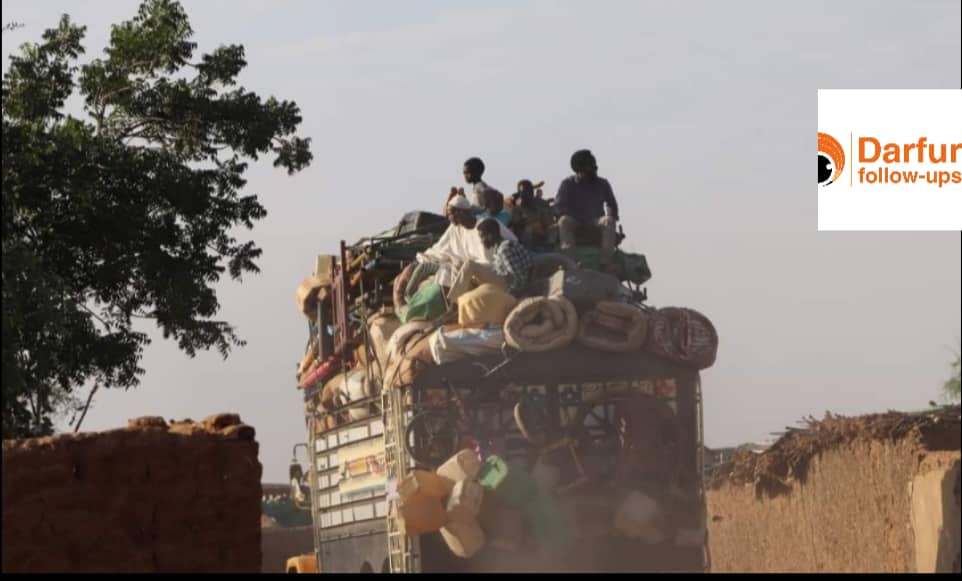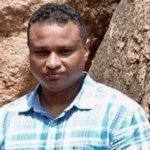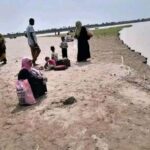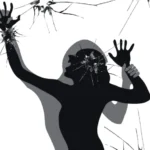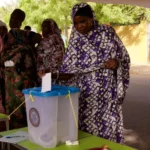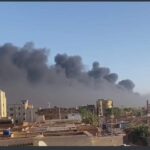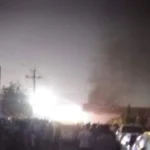Darfur Follow-ups: Enaam Al-Nour
The Darfur region in western Sudan is witnessing ongoing violent battles between the Sudanese army and the Rapid Support Forces, causing a large wave of displacement from cities and villages located within the scope of the clashes towards the Chadian border, amid United Nations organizations warning of the expansion of the circle of war in the region and its direct impact on civilians.
Since the outbreak of fighting between the army led by Lieutenant General Abdel Fattah al-Burhan, and the Rapid Support Forces led by Mohamed Hamdan Dagalo (known as Hemedti) on April 15, thousands have been killed and more than 5.7 million people have been forced to leave their homes, while 25 million, or more than half of the population, are in need. To humanitarian aid, according to the United Nations Office for the Coordination of Humanitarian Affairs.
During the past few days, the Rapid Support Forces expanded their attacks on the cities of El Geneina, Zalingei, and El Fasher after taking control of the city of Nyala. They announced in a video clip broadcast on November 4 their control over the command of the 15th Infantry Division in the city of El Geneina, as this is their first confrontation with the army forces in El Geneina, and said at their expense: On the “X” website (formerly Twitter), it “liberated the 15th Division and defeated the remnants and coup plotters in Western Darfur.”
As civilians in Darfur face one of the worst humanitarian nightmares in modern history, both sides portray themselves as peacemakers in negotiations in Saudi Arabia. Last Monday, the Rapid Support Forces published a video of its commander, Dagalo, who has remained out of sight throughout the conflict, in which he blamed Burhan for War and congratulated his forces on their “victories” in Darfur and Kordofan.
Sharing influence:
The army and the Rapid Support Forces share areas of influence in this region, which has experienced bitter dark years of fighting, and by controlling the army headquarters in El Geneina, West Darfur, the Rapid Support Forces have tightened their grip on three major cities out of five cities in the Darfur region, namely Zalingei. in the center and Nyala in the south, which control was announced last week, in addition to El Geneina in the west.
At the same time, the Rapid Support Forces are besieging the city of El Fasher, the capital of North Darfur, a few days after they announced control over the city of Nyala in the “strategic” state of South Darfur and annexing it to the city of Zalingei, the capital of Central Darfur, and their actual control over the city. “El Geneina” is the capital of West Darfur. If the city of “El Fasher” falls, it will have completed control of the strategic region and opened supply routes that the Sudanese army cannot control.
Observers pointed out that with the Rapid Support taking control of the states in Darfur steadily, amid expectations of its increase, and in light of such conditions, the military negotiator enters the Jeddah platform surrounded by mines on all sides. Therefore, any wrong form of output will have catastrophic consequences that threaten the stability of Sudan and its survival as a state. According to what prevailed before April 15th.
Kordofan next step:
According to political analysts, it is expected that the “Rapid Support” forces will head after leaving the Darfur region to the city of “Al-Obeid”, the capital of North Kordofan State – central-western Sudan – which they are besieging from all sides after seizing all the “localities of the state” and leaving only “central” Al-Abyad, which is controlled by the Haganah forces.
Surprisingly, the Sudanese army remained silent despite the large losses it incurred and is suffering as a result of the fall of its military bases in Darfur, while its supporters on social media contented themselves with denying the fall of those important bases, before they acknowledged their loss. It is not known precisely whether it was “support.” Al-Sura’i is trying to strengthen its negotiating position in the talks in the Saudi city of Jeddah by seizing the Darfur region and heading east, or is it seeking to inflict a complete defeat on the Sudanese army, as it controls Khartoum State on the ground, retains all the military units it extracted from the army, and attacks almost daily – Although the direct confrontations have decreased recently – the military sites that the army still controls.
Forced displacement:
For its part, the West Darfur State Revolutionary Bloc revealed in a statement on November 1 that the Rapid Support continues the forced displacement of civilians and targets innocent citizens, not just the 15th Infantry Division.
It indicated that a group of civilians were subjected to serious violations last week by the Rapid Support, while… They set out on foot towards Chad in search of shelter and safety.
Dozens of people were killed and wounded as a result of clashes between the army and the Rapid Support Forces in El Geneina.
Sources said that there have been ongoing displacement operations for two days from the city towards the entrance to the Chadian border region of Adre, and civilians are in very tragic circumstances.
The Adre region already includes thousands of people displaced from Darfur as a result of previous battles.
There is also a wave of displacement from the Naivasha and Abuja camps in the city of El Fasher, western Darfur, due to their fear of missiles and increasing clashes. These displaced people were originally living in camps near the city.
As a result of the expansion of the battles, the Sudanese Alliance Movement (former militants who signed a peace agreement with the government) announced the killing of a number of its members in a battle against the Rapid Support Forces, during its attack on the 15th Division command in the city of El Geneina on November 3 and 4 of this year.
The head of the coalition, Bukhari Ahmed, confirmed in a statement yesterday, Saturday, that there is a continuing attack by the Rapid Support on West Darfur state, accusing it of committing crimes, looting, stealing property, raping women, and targeting specific tribal groups, to displace them from their areas.
The position of the armed movements:
Sources revealed that the position of the armed movements is wavering, as some of them sided with the Rapid Support Forces openly, some of them are still hesitant to support them explicitly, and some of the movements that seemed close to the army are trying to jump away from it, after discovering that they are in the same basket with the Omar al-Bashir regime. It may lose the gains it achieved after the fall of his regime, and it may find itself facing repeated scenes if the remnants are destined to achieve a military victory, which is unlikely given the current field reality.
The same sources confirmed that some armed movements hailing from the Darfur region, which have been neutral since the outbreak of the war, face a political impasse if the Rapid Support Forces are able to impose full control over the region after their military victories, because they could be exposed to pressure or engage in a confrontation with the support forces if She couldn’t change her position
The sources expected that there would be changes in the structure of some armed movements that might lead to more splits within them, due to the difference in positions towards the army and the Rapid Support Forces.
There are leaders who want to bet on the latter after their military superiority in Darfur, and with a political settlement reached, the Rapid Support Forces will be an important number. In Sudan, unlike the army leadership, led by Abdel Fattah Al-Burhan, whose military and political future will be ambiguous.
In the recent period, remarkable positions have emerged for some armed movements, especially in the Darfur region, such as the Sudan Liberation Movement, whose leader and governor of the region, Minni Arko Minawi, confirmed that he is in contact with the “brothers” in the Rapid Support Forces. Days before that, the Sudan Liberation Movement was a wing of Minawi and the Justice and Equality Movement. Headed by Jibril Ibrahim, they disavowed a statement by the armed movements that signed the peace agreement, which described the Rapid Support Forces as a “rebel militia” and called for them to be “held accountable.”
The two movements said in a joint statement that the statement of the movements that participated in the Juba Consultative Forum was not discussed and developed by all the organizations whose names were mentioned at the end. The two movements stressed that the statement was issued at an inappropriate time and does not support efforts to resolve the national crisis and stop the bloodshed.
They continued, “We therefore affirm that the statement does not represent us, and we seize the opportunity to call on everyone to uphold the spirit of institutional work in order to strengthen alliances and promote political practice in this critical circumstance in Sudan’s history.” “
Observers believe that these positions reflect the beginning of a shift towards what is happening in Sudan, and that the armed movements are following with great interest the situation on the ground, on which they will ultimately base their directions during the coming period.
The civil forces seem less cautious about this, and some of their leaders do not hide their intersection to a large extent with the Rapid Support Forces, which was evident in the statements of the prominent leader of the Freedom and Change Alliance, Yasser Arman, who expressed this week his hope that the Rapid Support Forces will succeed in utilizing what they have achieved. For long-term strategic goals, in reference to neutralizing the previous regime.
The civil forces agree with the Rapid Support Forces in their position on the former regime, and both parties hold what they called “the remnants” responsible for the outbreak of the ongoing war since April 15, with the aim of shuffling the cards and returning to the scene again.
Analysts believe that although the civil forces are keen to show that they are the third equivalent in the Sudanese scene and are working to achieve this goal by forming an expanded front, in reality they are closer to the Rapid Support Forces.
The alternative capital threatens to fragment Sudan:
But what is most likely, according to analysts, is that the Rapid Support Forces’ control over important cities in Darfur – especially Nyala – gives them a wide scope for maneuver, and also allows them to obtain human supplies from their social environment, by using the borders between neighboring countries that are not friendly to the Sudanese army, and Nyala International Airport.
It also gives it the opportunity to announce a “government” in Darfur based on the decision of the night model, and similar to the government that moved from Khartoum to Port Sudan as an alternative capital, which threatens to fragment the country into cantons controlled by this or that party, which is what the “Civil Front” warned about, last month. .
The second commander of the Rapid Support Forces, Abdul Rahim Dagalo, had mentioned from within the 21st Zalingei Division after its capture, what he called “the end of the history of the Kizan,” and the destruction of the “Rapid Support” forces more than 1,300 tanks and 56 warplanes. He said that his forces were keen to Not to kill the Sudanese people.
At the same time, the army commander, Abdel Fattah al-Burhan, called for not tampering with the lives of the army.
He added: “(Rapid Support) left the army the gate of Wadi Sedna, an opening for escape, and they must leave before it is too late.
These are signs that the ‘Support Al-Sari’a intends to control the entire country, especially since it has been repeating that it is fighting Islamists and not the Sudanese army, and that it seeks to restore the democratic civil transition and hand over power to civilians, after defeating what it calls the “Army of the Kizan.”
UNITAMS warns:
“The Deputy Special Representative of the United Nations Secretary-General in Sudan – the official responsible for the UN mission – Resident Coordinator and Humanitarian Coordinator in Sudan, Clementine Nkwita Salami – expressed her ‘deep concern’ about the military escalation in Darfur and its impact on civilians,” said the Deputy Special Representative of the United Nations Secretary-General in Sudan. Special statement of the Secretary-General of the United Nations in Sudan and the Resident and Humanitarian Coordinator in a press statement yesterday, Thursday: “I am concerned about reports that civilians are caught up in the fighting between the Sudanese Armed Forces and the Rapid Support Forces in Darfur, in the context of escalating tribal tensions, which… “It recalls the events that took place in El Geneina, Darfur, last June.”
The UN official added: “Following the resumption of clashes between the Sudanese Armed Forces and the Rapid Support Forces since last Thursday, civilians were severely affected in the cities of Nyala, El Geneina, El Fasher and Zalingei in the Darfur region, where thousands of people were displaced, many were killed or wounded, and civilian property was destroyed.”
Salami called on all parties to the conflict in Sudan to fulfill their obligations under international human rights law and international humanitarian law to protect civilians during hostilities. The UN official said that the people of Darfur “have suffered enough.”
She added: “Civilians must be allowed to leave conflict-affected areas safely and without hindrance,” and at the same time stated, “At a time when much hope is pinned on the Jeddah talks to achieve a sustainable ceasefire and facilitate humanitarian access, I call on all parties to refrain from escalating the situation.” Conflict and its expansion.
The UN official indicated that the losses this conflict is inflicting on civilians are “unimaginable” and “the fighting must stop, and the parties to the conflict must ensure the safe passage of humanitarian aid to millions of people in Sudan who are in dire need of it.” Salami added, “according to United Nations statistics: Thousands have been killed during the war between the army and the Rapid Support since last April, and more than (5.7) million people were forced to leave their homes, while (25) million people – that is, more than half of the population – need humanitarian aid in Sudan.
No tendency to separate:
Advisor to the Rapid Support Commander, Al-Basha Muhammad Tabiq, says that their control of Nyala is part of the “operational plan” to liberate a number of military sites, including control of some of the army’s military division chiefs in the states in the coming days.
Regarding their direction to Darfur after their despair of seizing power in Khartoum, Tabeek told Al Jazeera Net that they control more than 90% of Khartoum, and are besieging the army headquarters and the headquarters of the Signal Corps in Khartoum North and the Mohandiseen in Omdurman, and they are also besieging the army’s 5th Division in Al-Obeid, the capital. North Kordofan State.
He confirms that they do not seek to implement the Libyan or Yemeni model or divide Sudan after controlling Nyala, and that they went to the Jeddah negotiations in appreciation of the conditions of the Sudanese people, and in response to the call for Saudi-American mediation.
Tabiq adds that the Jeddah platform seeks an agreement to establish a ceasefire, open humanitarian paths to provide aid to those affected by the war, and facilitate the return of citizens who left their homes.
He points out that the Rapid Support seeks a comprehensive reform of the state’s military and civil institutions to address the accumulated mistakes that have been practiced by the political elites since the country’s independence, and “we will not allow Sudan to be torn apart and dismantled into mini-states.”
History of conflicts:
The history of extensive armed conflicts between the two groups began in 1989; After the Sudanese Islamists, led by former President Omar al-Bashir, seized power through a military coup, and the African group represented by the Sudan Liberation Army Movement and the Justice and Equality Movement declared rebellion against the central authority in Khartoum in 2003, and achieved victories over the Sudanese army, Al-Bashir was forced to exploit Historical enmities between the two groups, he armed the “Arab Group” in order to fight alongside his army against the rebel group.
In 2003, the Arab group, which was later known as the “Janjaweed,” supported by the central government with combat helicopters and with the support of army forces, launched combat and war operations against the African group, during which men were killed, women were raped, villages were burned, and fields were set on fire, with comprehensive destruction. For infrastructure (water wells, schools, hospitals, etc.), large numbers of these tribes were forced to flee their homes.
Rich region:
The Darfur region is located in the west of the country. It is bordered to the north by Libya, to the west by Chad, and to the southwest by the Central African Republic and South Sudan. Its area is about 500 km, equivalent to the area of the Spanish mainland. It is inhabited by about 8 million people, and is inhabited by several other tribes. “Arab and African,” and its most important cities are “Al-Fasher, Nyala, El-Geneina, and Zalingei,” and during the era of former President Omar Al-Bashir, it expanded to five states: “East Darfur, North Darfur, West Darfur, South Darfur, and then Central Darfur.” “And the importance lies in The strategy for the region is that it represents a point of intersection between the “Francophone” African belt, which consists of the countries: Chad, Niger, Central Africa, and Cameroon, and the “Commonwealth” belt, within which Sudan is located, even if it does not join the group’s countries, and with the takeover of Darfur by the “Rapid Support” forces fighting the Sudanese army. It has provided itself with a wide area of logistical supply and human support, across the common borders with these countries, in addition to fighting within its “social incubator.”.

